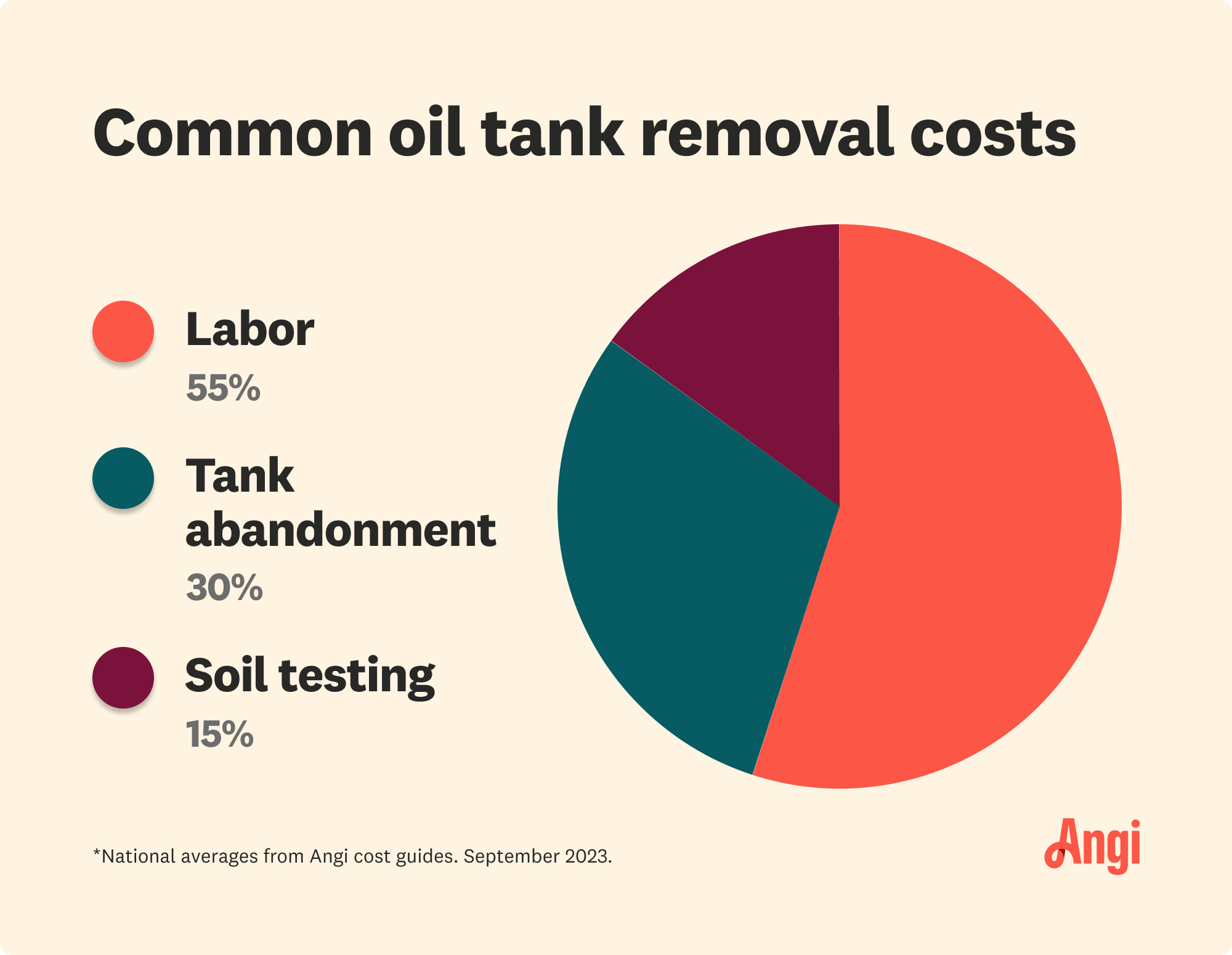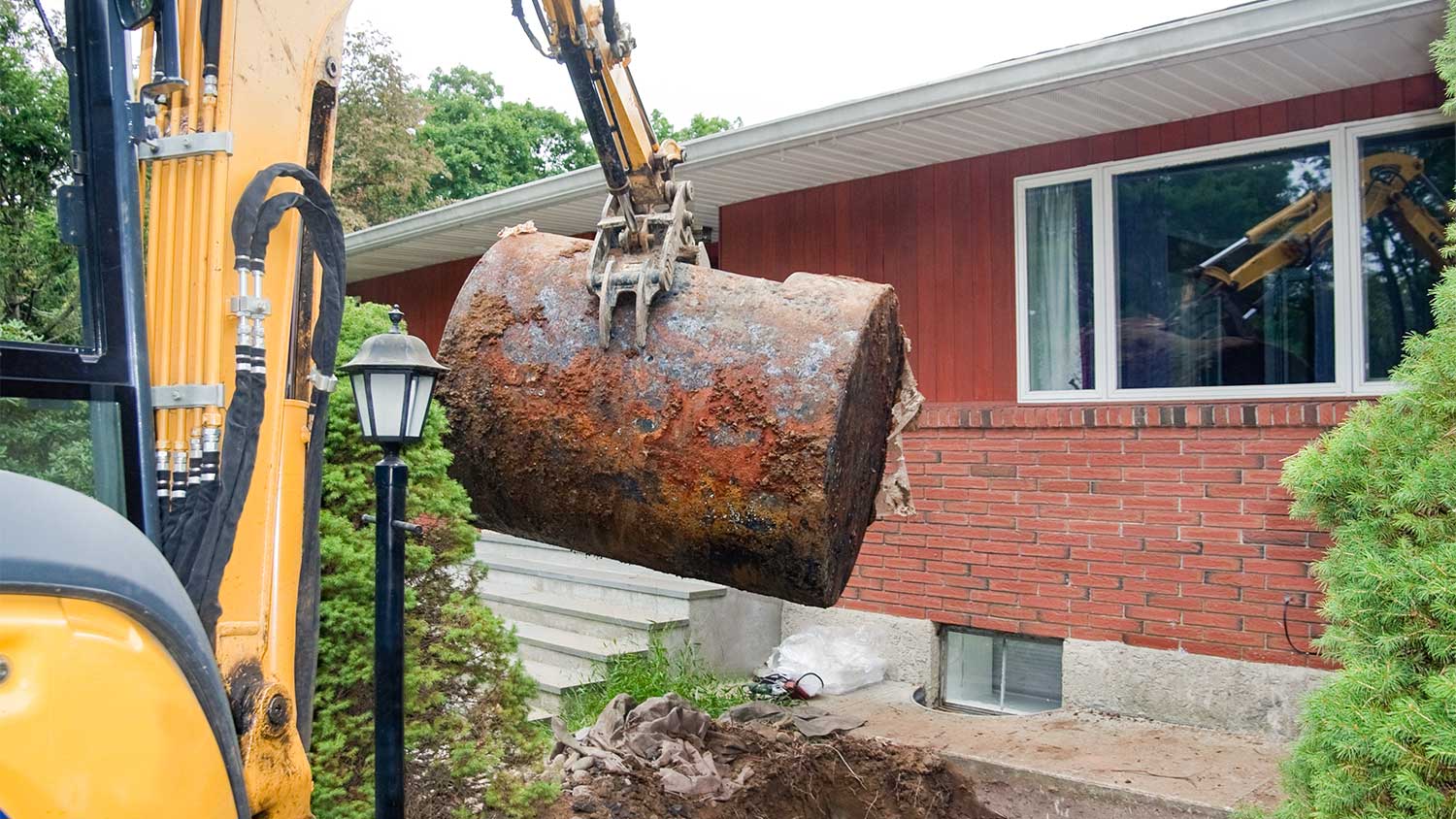How Much Does Oil Tank Removal Cost? [2025 Data]
The cost to remove an oil tank averages $1,352 but ranges between $580 and $2,124 or more depending on your tank's capacity. A pro can assess and factor in all costs.


You can simply abandon your tank to avoid removal costs, but that can be a liability, and you may end up having to remove it when you move anyway.
Removing an oil tank is the best way to avoid long-term issues.
Leaks, increased energy bills, and stains on your grass are signs that you need to remove your oil tank.
If there’s still oil in your tank, you’ll have to pay to have it safely removed and potentially tested.
If it's time to call timeout on your oil tank, expect to pay an average of $1,352 for oil tank removal—as long as there isn't an environmental issue lurking under the surface of your soil. While homeowners pay between $300 and $5,000 for all removals before factoring in the cost of oil tank replacement, there's a big difference between moving aboveground and underground oil tanks.
Project costs rise if an oil tank leak requires environmental remediation. This guide covers everything you need to know about budgeting for an oil tank removal.
Cost Factors for Removing an Oil Tank

Labor and size are the two big cost factors for removing an oil tank, which can range from $400 to $3,000. However, your estimate will include some fixed costs related to materials. Disposal fees for your old oil tank range from $200 to $700.
Labor
Contractors bundle labor and materials costs into one quote for oil tank removal because this is a labor-intensive job. As part of responsible tank removal, you'll need to have the soil surrounding your tank tested for leakage. While some tank removal contractors build this into the cost for removal or tank abandonment, others do not.
Soil Testing Costs
Soil testing during the removal of an aboveground tank averages $300. Testing underground oil tanks for leaks costs closer to $500.
Abandonment
If you prefer to have your decommissioned tank stay in the ground instead of hauling it away, this process is called oil tank abandonment. Your contractor will charge you for dirt fill or foam used to fill the tank after cutting it open.
The cost for tank abandonment services, including light excavation, cutting out of the tank, tank draining, tank washing, and the addition of foam or dirt fill, is between $1,000 and $3,000.
Tank Size
Bigger tanks cost more to remove because of the added labor of freeing, decommissioning, and hauling a bigger, heavier item. Size is less of a factor for aboveground tank removals than for buried tank removals simply because no unearthing is needed.
| Oil Tank Capacity (Gallons) | Average Removal Cost |
|---|---|
| 550 or less | $400–$1,200 |
| 1,000 | $1,300–$1,800 |
| 1,500 | $1,900–$2,200 |
| 2,000 | $2,300–$2,700 |
| 3,000 | $2,800–$3,000 |
Amount of Oil in the Tank
If you must remove unused oil, the price will bump higher. Heating oil services near you will price hazardous waste disposal by the pound or ounce. While end rates vary by town and city, you might pay between $10 and $70, including service fees.
Accessibility
Excavation needed to free a tank from the ground adds to project costs. If your tank is buried in a basement, you'll likely pay $500 to $1,000 extra for excavation and extraction. If you installed your tank while the house was under construction, you might need to dismantle it to fit through the door.
Remediation
If soil testing reveals a leak on your property, it will be necessary to have leak remediation done. These clean-up costs to remove harmful contaminants from your soil can cost $10,000 or more. In addition, your state may require you to report the leak to your state-level environmental agency to have a case opened.
Permits
The cost of permits for this project depends on where you live and the type of tank. Check with your municipality or fire department for costs. Obtaining a permit to remove an oil tank ranges from $30 to $160 on average.
Oil Tank Removal Cost by Type
Homeowners will see big differences in cost when removing underground tanks versus aboveground tanks. Excavation costs to unearth your buried tank can total as much as half of your bill. If your tank is in your basement, the work necessary to demolish the tank before fitting through a door can add $100 to $300 to your project's budget.
Underground Oil Tank

A tank buried in the ground can jump removal costs between $1,000 and $3,000. A tank buried in a basement may cost beyond the high range of $3,000.
Aboveground Oil Tank
The average cost to remove an aboveground oil tank will require less labor and usually falls between $300 and $1,000.
| Oil Tank Type | Average Removal Cost |
|---|---|
| Underground oil tank | $1,000–$3,000 |
| Aboveground oil tank | $300–$1,000 |
Anything that adds extra time to the process of getting your oil tank out of the ground is going to increase costs. Here are a few factors to consider when budgeting for this project.
Cost to Remove an Oil Tank Yourself
Removing an oil tank is not a DIY project. Most states require a closure license to remove a tank. Unfortunately, if you don’t have the expertise and tools to handle unexpected situations, you risk creating environmental hazards at your home and within the community.
Cost of Common Oil Tank Removal Add-Ons
Depending on your goals, there are some common add-ons that you can budget for and get done while having your oil tank removed:
New oil tank or replacement pricing: $1,200–$4,600
New oil furnace cost: $2,500–$10,000
Furnace inspection cost: $80–$200
Closing off and removing fuel lines: $125–$250
How Angi Gets Its Cost Data
Home is the most important place on earth, which is why Angi has helped more than 150 million homeowners transform their houses into homes they adore. To help homeowners with their next project, Angi provides readers with the most accurate cost data and upholds strict editorial standards. We survey real Angi customers about their project costs to develop the pricing data you see, so you can make the best decisions for you and your home. We pair this data with research from reputable sources, including the U.S. Bureau of Labor Statistics, academic journals, market studies, and interviews with industry experts—all to ensure our prices reflect real-world projects.
Want to help us improve our cost data? Send us a recent project quote to costquotes@angi.com. Quotes and personal information will not be shared publicly.
Frequently Asked Questions
Common signs that your oil tank is leaking include higher energy bills, an oily sheen seen in your water, an oil-like odor in your home or yard, stained patches of grass on your property, and dying vegetation.
Most states require soil testing at the same time as removal to check for hazardous pollutants that may have entered the ground. Oil can harm soil and water supplies. Removing a tank because it has degraded increases the chances that corrosion has allowed for leakage.
Most home insurance policies will not cover the cost of oil tank removal. However, some companies offer oil tank insurance policies that will pay for repairs. According to the U.S. Environmental Protection Agency (EPA), 36 states have funds that offer financial assistance for damage caused by oil tank releases.
Yes, you have to report a leaking oil tank because it’s considered an environmental hazard that can harm soil and water supplies. Soil samples must be taken by a certified professional if you have reason to suspect that your oil tank is leaking. Next, it's necessary to report the leak to your state's environmental agency.















